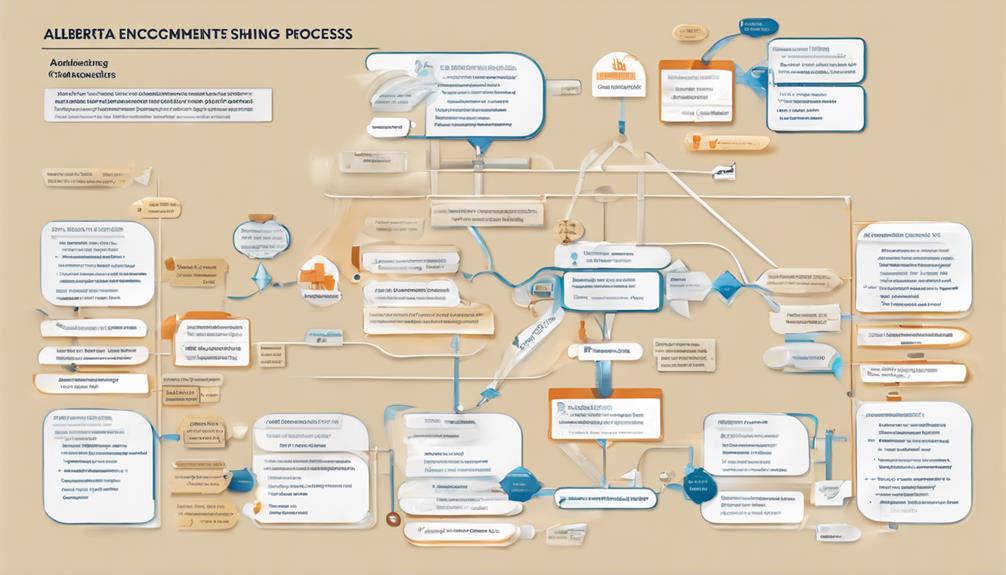MEP Alberta handles support payments, enforces court orders, and updates payment amounts. It encourages compliance to prevent legal issues. Established in 1985 under the Maintenance Enforcement Act, it collects millions in payments. Duties include ensuring accurate disbursals, taking collection actions, and locating parents. Enforcement methods include wage garnishment, license suspension, and asset seizure. MEP aids families in need and supports financial stability, impacting family well-being through vital support enforcement. The legal framework upholds integrity in support agreements. Discover more about MEP Alberta’s critical role in securing financial stability for families.
Key Takeaways
- Established in 1985 under the Maintenance Enforcement Act.
- Manages collection and distribution of support payments.
- Enforces court-ordered or agreed-upon support payments.
- Uses enforcement actions like wage garnishment and asset seizure.
- Assists in locating non-paying parents and updating support amounts.
MEP Alberta Overview
MEP Alberta efficiently manages the collection and distribution of support payments for children and families in Alberta. It plays an essential role in enforcing court-ordered or agreed-upon support payments, ensuring that children receive the financial assistance they deserve.
The program goes beyond just collecting money; it also assists in locating parents, enforcing support orders, and updating support amounts as needed. MEP Alberta emphasizes the importance of compliance, as failing to meet support obligations can result in legal repercussions for the non-compliant party.
By enforcing support orders, MEP Alberta aims to guarantee that children are adequately supported by both parents. Through its efforts, the program acts as a crucial link in the welfare of children and families in Alberta, ensuring that financial support is provided consistently and reliably.
Additionally, MEP Alberta works tirelessly to uphold the rights of children to receive the financial care they're entitled to from their parents.
History of MEP Alberta

MEP Alberta was established in 1985 under the Maintenance Enforcement Act to help families in Alberta enforce support orders.
Over the years, the program has achieved key milestones and evolved its services to better support children and families in the province.
The formation, milestones, and service evolution of MEP Alberta paint a rich history of commitment to ensuring financial stability for those in need.
Formation of MEP Alberta
Established in 1985 under the Maintenance Enforcement Act, MEP Alberta was formed to aid in the collection and enforcement of support payments. Operating under the Alberta government's direction, MEP Alberta guarantees families receive the financial support they deserve.
By enforcing court orders and support agreements effectively, MEP Alberta plays an essential role in upholding the rights of families in need. The program's inception marked a significant step in streamlining the process of support payment collection, providing a reliable avenue for those entitled to support payments.
Over the years, MEP Alberta has established itself as a key entity in the maintenance enforcement landscape, dedicated to serving the community and promoting financial stability for families in Alberta.
Key Milestones Achieved
Having solidified its role in upholding family rights and ensuring financial stability through support payment enforcement, MEP Alberta has marked numerous key milestones in its history.
Established in 1985, MEP Alberta has successfully collected and distributed millions of dollars in support payments, benefiting thousands of families in Alberta. Through the effective utilization of various collection tools, MEP Alberta has consistently enforced support orders, playing a critical role in facilitating maintenance payment enforcement in the province.
Over the years, the program has demonstrated a commitment to its mandate, achieving significant milestones in the domain of support payment enforcement.
Evolution of Services
Throughout its history, the evolution of services provided by MEP Alberta showcases a commitment to enhancing support payment enforcement through continuous adaptation and improvement.
- Introduction of various collection methods and tools to enforce maintenance orders.
- Adaptation to changes in legislation and technological advancements.
- Expansion of services to better support families in need of financial assistance.
- Reflects a commitment to improving the efficiency and effectiveness of maintenance enforcement processes.
Key Responsibilities of MEP

MEP in Alberta holds key responsibilities in enforcing court-ordered support payments. They ensure accurate disbursement to recipients and take collection actions against debtors who default.
Their duties include maintaining payment records to prevent disputes and provide evidence when necessary. MEP's oversight plays a crucial role in promoting financial stability for families in need through the enforcement of support obligations.
Role of MEP
Ensuring timely and court-ordered support payments for children, spouses, and partners in Alberta is a fundamental responsibility of MEP. To fulfill this role effectively, MEP undertakes the following tasks:
- Enforcing court-ordered support payments for families in need.
- Assisting in locating non-paying parents to guarantee timely payments.
- Monitoring and tracking support payments to prevent non-compliance.
- Having the legal authority to take collection actions against debtors who fail to meet their support obligations.
MEP's primary focus is to guarantee that families receive the financial support they're entitled to under the law. By executing these duties, MEP plays a vital role in safeguarding the welfare of children and spouses in Alberta.
Duties and Tasks
With a focus on enforcing court-ordered support payments in Alberta, the duties and tasks of MEP encompass a range of essential responsibilities to ensure recipients receive the financial support they are owed. MEP is responsible for tracking and collecting support payments from debtors, ensuring that recipients receive their due support. They maintain accurate records, process payments, and enforce support orders. MEP has the legal authority to take various collection actions against non-compliant payors, playing an important role in promoting financial stability and ensuring that support obligations are met.
| Key Responsibilities of MEP | Description |
|---|---|
| Enforcing Support Payments | Tracking and collecting support payments from debtors |
| Record Maintenance | Maintaining accurate records of support payments |
| Support Order Enforcement | Enforcing court-ordered support payments |
Accountability and Oversight
After tracking and collecting support payments from debtors and enforcing court-ordered support payments in Alberta, the accountability and oversight role of MEP involves ensuring timely disbursement of maintenance payments to recipients. To fulfill this responsibility effectively, MEP employs various strategies:
- Maintaining Accurate Records:
MEP keeps detailed records to prevent disputes and guarantee transparency in payment processing.
- Enforcing Compliance:
MEP has the authority to take decisive actions against non-compliant payors to uphold court orders.
- Promoting Financial Stability:
MEP plays a significant role in fostering financial stability for families in need by enforcing support payments.
- Preventing Delays:
MEP works diligently to avoid delays in the disbursement of maintenance payments, prioritizing the financial well-being of recipients.
MEP Enforcement Processes

MEP employs a variety of enforcement actions to collect outstanding support payments. These measures, such as garnishing wages and seizing assets, are vital to guarantee that court-ordered support payments are enforced effectively. In addition to wage garnishment and asset seizure, MEP can also suspend licenses and take legal steps to collect overdue payments from debtors.
The agency has the authority to freeze bank accounts and intercept tax refunds as part of its enforcement processes. By utilizing these enforcement mechanisms, MEP aims to secure and distribute support payments efficiently, ultimately contributing to the financial stability of families who depend on these payments.
Through these enforcement actions, MEP plays a significant role in upholding the integrity of the support payment system and holding individuals accountable for their financial obligations.
Support Payment Collection Methods

Support payment collection methods employed by MEP in Alberta encompass a range of effective strategies to guarantee timely and consistent payment from obligors. These methods include:
- Wage Garnishment: MEP can deduct support payments directly from the payor's income, ensuring regular collection.
- Asset Seizure: The program has the authority to seize assets to enforce payment compliance effectively.
- License Suspension: MEP can suspend licenses as a method to encourage obligors to fulfill their support payment obligations.
- Bank Account Seizure and Tax Refund Interception: Utilizing tools such as seizing bank accounts and intercepting tax refunds, MEP reinforces the importance of meeting support payment responsibilities.
MEP Outreach and Assistance

Providing valuable outreach and assistance, MEP in Alberta guarantees that support recipients facing non-payment situations receive the necessary aid. The assistance offered includes help with locating parents, enforcing support orders, and updating support amounts. While MEP does not provide legal representation, it prioritizes the effective enforcement of support payments. Recipients and payors must seek legal help for any modifications to court orders. MEP's focus is on providing structured support to make sure that children receive financial assistance from both parents.
| Outreach and Assistance | Details |
|---|---|
| Locating Parents | Assistance in finding parents for support enforcement |
| Enforcing Support Orders | Ensuring court-ordered support payments are met |
| Updating Support Amounts | Assistance with adjusting support payments when necessary |
MEP's outreach and assistance aim to establish a system that supports families in need, ensuring that children receive the financial support they require.
MEPs Impact on Families

MEP Alberta plays an essential role in ensuring that children receive the financial support they need from both parents, which ultimately promotes their well-being. By providing a structured process for enforcing support obligations, MEP helps maintain consistency and reliability in support payments.
Additionally, MEP's support in guiding legal procedures related to maintenance payments helps reduce the financial burden on custodial parents, ensuring timely and entitled support.
Family Well-being
Improving the well-being of families in Alberta, the MEP program guarantees that financial support reaches those who are entitled to it. Here are four ways MEP impacts family well-being:
- Enforcing Support Payments: MEP plays an important role in ensuring that support payments are enforced, promoting financial stability for families.
- Reducing Financial Stress: By assisting custodial parents in receiving necessary financial support, MEP helps alleviate financial burdens, contributing to family well-being.
- Promoting Stability: MEP's actions in enforcing maintenance payments aid in maintaining family stability and welfare.
- Ensuring Fairness: Through transparent record-keeping and efficient disbursement, MEP upholds fairness and integrity in support arrangements, benefiting families in need.
Support Systems
Ensuring timely and consistent maintenance payments, the Maintenance Enforcement Program (MEP) plays a crucial role in supporting families in need. By helping to prevent disputes and ensuring transparency in financial support arrangements, MEP integration post-divorce or separation aids in covering essential expenses and child care.
The program provides a structured process for recipients to obtain entitled support payments, maintaining integrity and fairness in enforcing support obligations. Through MEP's involvement, families can rely on a reliable system that prioritizes their well-being and financial stability.
This support system not only benefits families directly but also contributes to building a more secure and sustainable environment for children and parents alike.
Legal Framework Supporting MEP

The legal foundation of the Alberta Maintenance Enforcement Program is established through the Maintenance Enforcement Act (MEA), ensuring the fulfillment of financial support responsibilities. MEA plays a pivotal role in enforcing maintenance payments by implementing essential legislation that impacts individuals and families in Alberta, Canada. Here are four key aspects of the legal framework supporting MEP:
- Regulatory Provisions: MEA provides necessary regulations to govern support payments effectively.
- Enforcement Mechanisms: The act includes enforcement mechanisms to guarantee compliance with maintenance obligations.
- Impact on Individuals: MEA directly affects individuals by overseeing the fulfillment of financial support responsibilities.
- Understanding Family Law: MEA is instrumental in understanding the complexities of family law in Alberta, providing clarity and structure in matters concerning maintenance payments.
MEA's thorough legal framework ensures that financial support obligations are met, benefiting both recipients and those responsible for providing support.
MEPs Role in Court Proceedings

MEP's involvement in court proceedings is strictly limited to enforcing support orders issued by the court. They do not provide legal representation or handle court orders and modifications. Recipients and payors are advised to seek legal assistance for any court-related matters as MEP's focus is on guaranteeing support payments are made. Below is a table summarizing MEP's role in court proceedings:
| Aspect | Details |
|---|---|
| Legal Representation | Not provided by MEP. |
| Handling Court Orders | Court orders and modifications are not within MEP's scope. |
| Focus of MEP | Enforcing support payments rather than participating in court proceedings. |
| Seeking Legal Assistance | Recipients and payors should seek legal help for court matters. |
| Limitation of Role in Court Proceedings | MEP's role is strictly limited to enforcing support orders issued by the court. |
MEP's primary function is to make sure that support payments are made promptly and reliably, leaving legal matters to be addressed by appropriate legal services.
Future Developments for MEP Alberta

Consistently working to enhance its services, MEP Alberta is exploring future developments to improve support payment processes. These developments aim to streamline communication, enhance customer service, and adapt to changing needs efficiently. Here are four potential future developments for MEP Alberta:
- Implementing advanced technology to simplify payment processing and enhance accuracy.
- Creating online portals for easier account management and increased transparency in payment tracking.
- Enhancing customer service to provide better support for both recipients and payors.
- Adapting to changing regulations promptly to guarantee timely support payments for families.
Frequently Asked Questions
What Can MEP Do in Alberta?
In Alberta, MEP can collect child, spousal, and partner support payments. It has the power to garnish wages, seize assets, suspend licenses, and freeze services for non-payment. MEP enforces support orders issued by the court or through legal agreements.
How Does MEP Work?
MEP in Alberta enforces support orders issued by the court or through agreements. It can assist in locating parents, update support amounts, and guarantee compliance with the orders. Non-compliance can lead to legal consequences.
What Can Maintenance Enforcement Garnish in Alberta?
Maintenance Enforcement in Alberta can garnish wages, bank accounts, rental income, and federal payments like tax refunds. They have the authority to seize funds directly from debtors' accounts. Personal property and assets may also be seized.
What Is a Stay of Enforcement Alberta?
A stay of enforcement in Alberta temporarily suspends Maintenance Enforcement Program actions, providing relief from immediate support payment collection. Under specific circumstances, individuals can apply for a stay, pausing MEP actions for a period of time.
How Can MEP Alberta Help Prevent Burglary and Trespassing?
MEP Alberta specializes in enhancing security measures to prevent burglary and trespassing differences. By implementing advanced surveillance systems and access controls, MEP Alberta helps deter potential intruders and unauthorized individuals from entering your property. Their expertise in security technology can significantly reduce the risks of burglary and trespassing.
Conclusion
In summary, MEP Alberta plays a vital role in ensuring child support payments are made promptly and efficiently. With a robust legal framework supporting its operations, MEP Alberta continues to impact families in a positive way.
As the program evolves, future developments promise to further streamline processes and improve outcomes for all involved. So, stay tuned for what the future holds for MEP Alberta!










